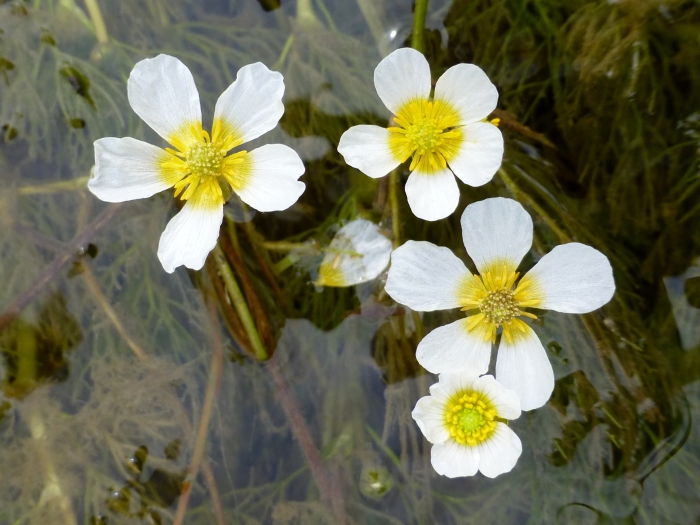Threadleaf Crowfoot
(Ranunculus trichophyllus)
Threadleaf Crowfoot (Ranunculus trichophyllus)
/
/

Murray NZ
CC BY 4.0
Image By:
Murray NZ
Recorded By:
Copyright:
CC BY 4.0
Copyright Notice:
Photo by: Murray NZ | License Type: CC BY 4.0 | License URL: http://creativecommons.org/licenses/by/4.0/ | Rights Holder: Murray NZ | Publisher: iNaturalist | Date Created: 2013-11-16T14:51:08-08:00 |

























Estimated Native Range
Summary
Ranunculus trichophyllus, commonly known as threadleaf crowfoot or thread-leaved water-crowfoot, is an herbaceous plant that can be either annual or perennial. It is native to a variety of aquatic environments including slowly-flowing streams, ponds, and lakes, often found at elevations up to 9,800 feet. This species is widespread across Europe, Asia, and North America, with a presence in diverse locations such as the United States, the Himalayan region, and even the high-altitude lakes of Mount Everest. The plant typically has a delicate appearance, with daisy-like white flowers that have a yellow center and five petals. Its segmented leaves are finely dissected and can photosynthesize underwater, which is a unique adaptation to its aquatic habitat.
Threadleaf crowfoot is valued for its ecological role in phytofiltration, as it has the ability to remove heavy metals from water, including arsenic. This makes it useful for bioremediation projects. In cultivation, it is appreciated for its delicate flowers and its ability to thrive in water gardens or natural ponds. It requires an aquatic environment to grow, with either standing or slow-moving water, and full sun to part shade. While it is not commonly used in traditional garden settings, it is an excellent choice for water features and can contribute to the ecological health of such environments. Care should be taken to manage its growth, as it can spread rapidly under ideal conditions.CC BY-SA 4.0
Threadleaf crowfoot is valued for its ecological role in phytofiltration, as it has the ability to remove heavy metals from water, including arsenic. This makes it useful for bioremediation projects. In cultivation, it is appreciated for its delicate flowers and its ability to thrive in water gardens or natural ponds. It requires an aquatic environment to grow, with either standing or slow-moving water, and full sun to part shade. While it is not commonly used in traditional garden settings, it is an excellent choice for water features and can contribute to the ecological health of such environments. Care should be taken to manage its growth, as it can spread rapidly under ideal conditions.CC BY-SA 4.0
Plant Description
- Plant Type: Herb
- Height: 0.1-0.1 feet
- Width: 0.1-0.5 feet
- Growth Rate: Moderate
- Flower Color: White
- Flowering Season: Spring, Summer
- Leaf Retention: Deciduous
Growth Requirements
- Sun: Full Sun, Part Shade
- Water: Aquatic
- Drainage: Standing
Common Uses
Low Maintenance, Water Garden
Natural Habitat
Slowly-flowing streams, ponds, and lakes at elevations up to 9,800 feet
Other Names
Common Names: Threadleaf Crowfoot, Featherfoil, White Water Buttercup, Whitewater Crowfoot, Vasssoleie
Scientific Names: , Ranunculus trichophyllus, Batrachium aquatile var. caespitosum, Batrachium heterophyllum f. dissectum, Batrachium paucistamineum subsp. trichophyllum, Batrachium paucistamineum subsp. trichophyllum, Batrachium salsugineum, Batrachium trichophyllum subsp. pantothrix, Ranunculus amporitanus, Ranunculus aquatilis subsp. diffusus
GBIF Accepted Name: